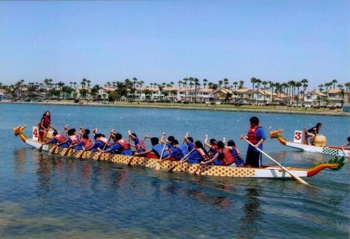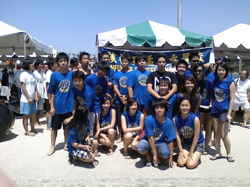The lessons of dragon boating
Jessica, 17, thought racing dragon-shaped boats would be a good way to get community service hours, but instead she learned a lot about teamwork and competition.
Jessica's team competes at the ViewSonic Long Beach Dragon Boat Festival last summer.

Photos by Daniel Fu, 15, Walnut HS
“How about you dragon boat?”
“Huh?”
It was right before the start of summer and my friend James and I were discussing how to complete our community service hours for the IB (International Baccalaureate) program at our high school. To receive your IB diploma you must fulfill at least 150 hours. These activities are further divided into three categories—Creativity, Action and Service—with a minimum of 30 hours required for each category. The category that I was struggling to get hours for was Action. Most IB candidates I knew had earned their hours for this category by joining a sports team at school.
Sadly, I had never exactly been the athletic type. While the rest of my family would play tennis, basketball or baseball on a weekly basis, I spent my free time playing piano and violin at home. As a result, I had about twice as many hours for Creativity as I did for Action. Now going into my senior year, I thought that I would be too busy filling out college applications to join a sports team at school.
I had heard about dragon boat racing in middle school but always thought that paddling a boat with an enormous dragon head on the front looked corny. But I was eager to join a team if it would get me easy community service hours and I already knew people who had joined dragon boat teams before. Ultimately, my decision to try the sport taught me much about what I had been missing out on. Not only did I get to experience the intensity of practices and competitions, but I also learned the importance of teamwork.
I signed up for a local team. I knew most of the team members from school although I had never really talked to them before. For six weeks, we would be practicing at a lagoon in Long Beach, about a 45-minute drive from where I live, and we would then compete in the ViewSonic Long Beach Dragon Boat Festival.
For our first practice, I wasn’t sure what to expect. There were about 18 people on our team, and, like me, most of them had never even gotten into a dragon boat before. After getting our life jackets and paddles, we did a couple of warm-up exercises, such as jumping jacks and push-ups. Next, we practiced leaning forward at the same time. Our coach made us get into two lines, sit down on the grass and place one hand on the shoulders of the person in front of us. When we heard “go,” we would all bend our bodies forward in unison. According to our coach, if we could imitate this movement as we paddled, the boat would go faster. I felt a bit silly because other people on the beach were gawking at us as we warmed up.
After half an hour sitting in the sun, I felt ready to go into one of the boats and do some serious paddling. Imagine my surprise when we were not allowed to row out into the lagoon! Unfortunately, not everyone on the team had gotten their parents to sign a liability form. A woman in charge of renting out the dragon boats said that we were not allowed to go out into the water, even if we all were wearing life jackets. The most we could do was get in the boat while it was tied to a pole and practice paddling.
Disappointed, I climbed into the boat and tried to make the most out of the remainder of our practice time. Even though I learned the basic movements, which consisted of dragging the paddle in the water and twisting my shoulders, during that first practice, I kept on wishing that we could actually move through the water. My teammates grumbled but tried to make the most out of the afternoon practice. On the way home I began to question why I had joined a dragon boat team in the first place.

Luckily, our second practice was much more rewarding and tiring. Because we had spent our first practice with the boat tied to the shore, I was not used to the water current pulling my paddle in opposite directions and by the end of practice, I could feel the weight of my wooden paddle pulling my elbows down. At the same time, a burning sensation crept up the muscles in both of my arms. But I knew I could not stop paddling because no one else on the team had stopped either.
We succeeded in transferring the leaning motion that we had done on land during the first practice onto the boat. Our ability to follow each other made a huge difference in how fast the boat went. After seeing improvement in the team and myself, I left this practice feeling much more satisfied.
During the next four weeks, we continued to practice in Long Beach every Saturday afternoon. If our captain felt that we needed more time, he would hold practices at his home on weekdays. During these practices, we experimented with using different paddle strokes in his swimming pool. Eventually, we learned not to drag our paddles in the water for as long so that our movements could be swifter. Even though I thought that my body was becoming stronger, the practice runs were becoming more grueling as well. My entire body would ache after each practice. I would get home before six every time but spend the rest of the day just resting on my back in the comfort of my room, not wanting to move at all. The most painful part of my body was my shoulders, which I had to rotate constantly when paddling.
As time passed, I also bonded with my teammates. We all got to know each other through carpooling to Long Beach and back every practice. On some days, the parents would reward us by taking us out to In-N-Out. I got to know people whom I had never said more than a “hello” to at school. It was at In-N-Out that I discovered how diverse the team really was. There was the boy who hoped to join the Marines, the girl who wanted to become the next great fashion designer. Like me, many of them believed that dragon boat racing would be a fun way to get community service hours, but they also wanted to win.
Three people on the team had competed last year and they acted as our leaders throughout the six weeks and constantly gave us advice on how to improve our strokes. For instance, they told me to stop looking down at the water so much and to focus on the person paddling in front of me. As long as we each followed the person in front of us, our strokes would be together. For the rest of the time before the race, I tried to keep these words in mind.
On the day of the big race, we all arrived early to set up our team tent. When it was our time to race, we got into a boat and paddled out to where the starting point for each team was. As we paddled, we passed by smiling parents and screaming toddlers. Lining up in our team’s lane, I could feel the intensity rising. It took what seemed like ages for us and the three teams we were racing against to line up correctly. All of the teams had trouble straightening their boats so that they wouldn’t crash into the lanes at the beginning of the race. Our team was the first to straighten our boat, so we just sat and stared in front of us, trying to see the finish line.
Looking in front of and behind me, I could see my teammates fidgeting nervously in the boat. We had trained for six weeks, and this race would show how far we had come. I realized that despite our different personalities, at that moment we were one team, all united toward a common goal.
Suddenly, our steerer (the person responsible for making sure that we don’t crash into anything) yelled, “Paddles up! In the water!”
Then we heard the announcer’s booming voice. “Are you ready? 1 … 2 … 3!”
The horn sounded and we were off. I cannot recall a day before the race when I paddled with so much energy. More water was flying everywhere than I had ever seen during any of our practices, but I did not care and kept on going. If salt water splashed into my eyes, I would just squint and try to follow the paddlers in front of me. It was difficult not to look at the other teams on either side of me. I could hear paddles splashing against the water and the voices of the other callers (those who yell when to stroke) urging their teams on and yelling out commands. To distinguish my team’s caller from the rest, I had to keep looking straight ahead down our lane. At one point, I did turn my head to look at the sidelines, but all I could see was a blur of colors. Every time one of the teams next to us pulled ahead, I would hear our caller raising her voice, hoping to make us paddle even quicker. By the time we crossed the finish line, I was physically exhausted and felt like my arm was going to fall off. When we reached shore, the judges announced our time, 2 minutes and 50 seconds—a big improvement from our practice times.
Our team went on to participate in two more races that day. Despite the hectic schedule, we got enough rest in between each heat that I didn’t get too tired. Although we did not very place very high (third to last) in the final heat, I do not regret deciding to do dragon boat racing because it was the first team sport that I really enjoyed When my mother asked me later if I would do it all again, I just grinned. Maybe I’ll even join another team in college.
If you liked this story, you should check out …
Faster than a speeding dragon. Mel, 15, likes this ancient Chinese sport because of the team camaraderie and it’s unique. WITH PHOTO GALLERY. (January – February 2007)







